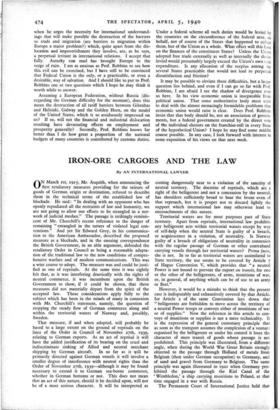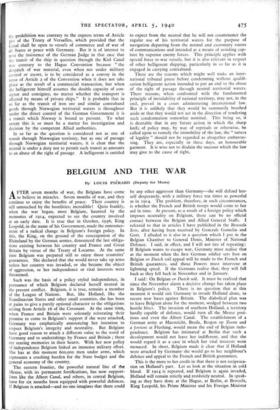IRON-ORE CARGOES AND THE LAW
By AN INTERNATIONAL LAWYER
ON March 1st, 1915, Mr. Asquith, when announcing the first retaliatory measures providing for the seizure of goods of German origin or destination, refused to describe them in the technical terms of the established law of blockade. He said: " In dealing with an opponent who has openly repudiated all the restraints of law and humanity, we are not going to allow our efforts to be strangled in a net- work of judicial meshes." The passage is strikingly reminis- cent of Mr. Churchill's recent reference to the danger of remaining " entangled in the tatters of violated legal con- ventions." And yet Sir Edward Grey, in his communica- tion to the American Ambassador, described the proposed measure as a blockade, and in the ensuing correspondence the British Government, in an able argument, defended the retaliatory Order in Council as being a reasonable adapta- tion of the traditional law to the new conditions of compre- hensive warfare and of modern communications. This was a wise course to adopt. The measure was and could be justi- fied as one of reprisals. At the same time it was rightly felt that, as it was interfering drastically with the rights of neutral commerce, it was incumbent upon the British Government to show, if it could be shown, that these measures did not materially depart from the spirit of the accepted law. These considerations apply fully to the subject which has been in the minds of many in connexion with Mr. Churchill's statement, namely, the question of stopping the steady flow of German commerce along and within the territorial waters of Norway and, possibly, Sweden.
That measure, if and when adopted, will probably be based to a large extent on the ground of reprisals on the lines of the Order in Council of November 27th, 1939, relating to German exports. As an act of reprisal it will have the added justification of its bearing on the cruel and indiscriminate sinking of Allied and neutral merchant shipping by German aircraft. In so far as it will be primarily directed against German vessels it will involve a smaller degree of interference with neutral rights than the Order of November 27th, 1939—although it may be found necessary to extend it to German sea-borne commerce, whether in German bottoms or not. This does not mean that an act of this nature, should it be decided upon, will not be of a most serious character. It will be interpreted as coming dangerously near to a violation of the sanctity of neutral territory. The doctrine of reprisals, which are a right of the belligerent and not a concession by the neutral, has shoulders sufficiently broad to bear the brunt even of that reproach, but it is proper not to discard lightly the support which international law may otherwise lend to encroachments of this nature.
Territorial waters are for most purposes part of State territory. Apart from reprisals, international law prohibits any belligerent acts within territorial waters except by way of self-help when the neutral State is guilty of a breach, or acquiescence in a violation, of neutrality. Is Norway guilty of a breach of obligations of neutrality in connexion with the regular passage of German or other contraband carrying vessels through her territorial waters? Prima facie, she is not. In so far as territorial waters are assimilated to State territory, the use seems to be covered by Article 7 of Hague Convention V, which provides that " a neutral Power is not bound to prevent the export en transit, for one or the other of the belligerents, of arms, munitions of war, or, in general, of anything which can be of use to an army or fleet."
However, it would be a mistake to think that the present case is indisputably and exhaustively covered by that Article, for Article 2 of the same Convention lays down that " belligerents are forbidden to move across the territory of a neutral Power troops or convoys either of munitions of war or of supplies." Now the reference in this article to con- voys of munitions or supplies is not a mere technicality. It is the expression of the general customary principle that as soon as the transport assumes the complexion of a venture organised by the belligerent or under his control it loses the character of mere transit of goods whose passage is not prohibited. This principle was illustrated, from a different angle, when during the World War Great Britain strongly objected to the passage through Holland of metals from Belgium (then under German occupation) to Germany, and of sand and gravel from Germany to Belgium. The same principle was again illustrated in 1921 when Germany pro- hibited the passage through the Kiel Canal of the ' Wimbledon,' a ship carrying munitions to Poland, at that time engaged in a war with Russia.
The Permanent Court of International Justice held that the prohibition was contrary to the express terms of Article 38o of the Treaty of Versailles, which provided that the Canal shall be open to vessels of commerce and of war of all States at peace with Germany. But it is of interest to note the insistence of the German Judge in that case that the transit of the ship in question through the Kiel Canal was contrary to the Hague Convention because " the despatch of war material, even when not under military control or escort, is to be considered as a convoy in the sense of Article 2 of the Convention when it does not take place as the result of a commercial transaction, but when the belligerent himself assumes the double capacity of con- signor and consignee, no matter whether the transport is effected by means of private ships." It is probable that in so far as the transit of iron ore and similar contraband goods through Norwegian territorial waters is throughout under the direct control of the German Government it is a transit which Norway is bound to prevent. To what extent this is so must be a matter for investigation and decision by the competent Allied authorities.
In so far as the question is considered not as one of transit through Norwegian territory, but as one of passage through Norwegian territorial waters, it is clear that the neutral is under a duty not to permit such transit as amounts to an abuse of the right of passage. A belligerent is entitled to expect from the neutral that he will not countenance the regular use of his territorial waters for the purpose of navigation departing from the normal and customary routes of communications and intended as a means of avoiding cap- ture by superior enemy forces. This principle applies with special force to war vessels, but it is also relevant in respect of other belligerent shipping, particularly in so far as it is engaged in carrying contraband.
These are the reasons which might well make an inter- national tribunal pause before condemning without qualifi- cation belligerent action intended to put an end to the abuse of the right of passage through neutral territorial waters. These reasons, when confronted with the fundamental principle of inviolability of national territory, may not, in the end, prevail in a court administering international law. But it is unlikely that they would be summarily brushed aside or that they would not act in the direction of rendering such condemnation somewhat nominal. This being so, it is desirable that in any future action in which the sharp knife of policy may, by way of reprisals or otherwise, be called upon to remedy the immobility of the law, the " tatters of legality " should not be regarded as altogether embarras- sing. They are, especially in these days, an honourable garment. It is wise not to disdain the succour which the law may give to the cause of right.















































 Previous page
Previous page